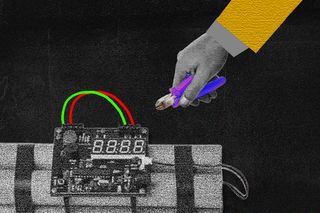
New Research Shows Why Decisive People Don’t Necessarily Make Better Choices
People who are indecisive and struggled more to commit to a decision are not necessarily “bad” decision-makers.

Sometimes it just takes three words to post a question ever-so haunting: this or that? Between two things, what would you choose? Things get more daunting when life throws a multiple-choice question at people; when the answer is not contained between two options, but a limitless set of permutations. Some more than others find it easier to cogently reach a decision. Others, the lot doomed to suffer under the cultural baggage of being “indecisive,” spend longer weighing contingencies, neatly lining up the pros next to cons in pursuit of the right answer.
Decisions fall in the sweet — yet unreachable — spot between rational thinking and going with the gut. If the end goal is to make right decisions in the long-term, people who are traditionally decisive are lauded for their magical and efficient thinking. How does one reach an answer without a shadow of a doubt?
For those terrible at deciding between people, places, food orders, major life decisions, any matter big or trivial, here’s an affirming piece of research to put things in perspective. While decisive people may be more visibly confident in their choices, their decisions are no more accurate thanthose of others.
Published in the journal PLOS One on Wednesday, the study maps out just how much quick decision-making aligns with “good” choices. To reach a reliable indicator of what makes one person decisive and the other not, researchers used the Action Control Scale — a yes or no questionnaire about everyday choices. Things like if people get bored quickly after learning a new game, or if they spend too long thinking about where to begin with a big project as opposed to just jumping right in.
This brought forth two categories of people: those who are action-oriented, and those state-oriented. The first is all about committing to the action, being decisive, and implementing what they decide even if things go awry. On the other hand, people who are state-oriented are indecisive and more likely to abandon the choices they make.
With definitions in place, the researchers asked 723 participants to take a series of cognitive tasks, all requiring minimal risk. For instance, which snacks would someone eat? Was a cloud moving left or right? In one task, they were shown a warped picture of a house or a face and asked to decide which of the two the picture represented. The participants were assessed on multiple factors, two among them being how accurately they themselves judge the accuracy of their choice and how confident they were with the whole ordeal.
Related on The Swaddle:
Why It Is Hard to Make Some Decisions – and Not Others
“The only difference in the two groups, across all of the experiments, was that action-oriented people were more confident in their choices,” wrote Wojciech Zajkowski, the first author of the research. There was no recorded difference in accuracy, cautiousness, bias; the state-oriented group was just as good at making choices.
It really boiled down to confidence: people who were indecisive and struggled more to commit to a decision are not necessarily “bad” decision-makers, just less confident ones.
The thing with decisions and choices is: rightness and wrongness don’t exist in a world of moral absolutes. So, while the research may not be instructive in showing how people should make decisions, it proves reassuring and even offers redemption to those culturally dismissed for “taking too long” or “running in circles.” Indecisive people are a vast majority of us; so many attest to feeling a choice overload.
Our current interpretation of decisiveness is also fraught with cultural bias. Any lag in decision-making is conflated with a lack of decisiveness — not necessarily a marker of inefficient decision making. This in some ways is also a gendered problem. Some research on cis-gendered people shows men, thought to be rational thinkers, are more likely to take risks in stressful situations like making decisions. On the other hand, women are more likely to take their time to arrive at the most efficient decision, evaluating the risks of decisions — perhaps due to years of conditioning and gendered experiences of family and work. Arguably carefully thought-out decisions can even prove useful when making life-altering decisions.
“…in reality, immediate decisions are often not well thought out, regardless of how efficient they may seem in the beginning,” Therese Huston, Ph.D., founding director of the Center for Faculty Development at Seattle University, told Forbes.
This theory is echoed in the findings of the current research too. Indecisive people are not intrinsically bad at making decisions, for the way they process evidence and knowledge is quite the same as the decisive lot. So the way we place them in our cultural context demands a rethink too.
If Hamlet were to ask today and now, “To be or not to be,” I’d tell him to take his time and think about it. Anything better than a hasty, split-second decision, yes?
Saumya Kalia is an Associate Editor at The Swaddle. Her journalism and writing explore issues of social justice, digital sub-cultures, media ecosystem, literature, and memory as they cut across socio-cultural periods. You can reach her at @Saumya_Kalia.
Related


Being Conscious Under Anesthesia Is More Common Than We Thought, Shows Research
